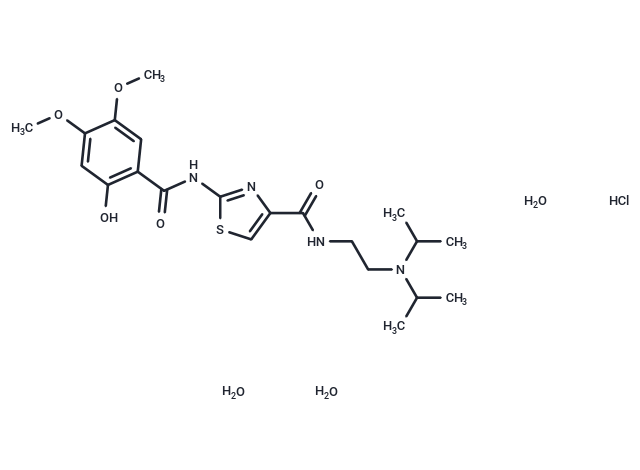 Your shopping cart is currently empty
Your shopping cart is currently empty

Acotiamide monohydrochloride trihydrate (Z-338 HCl) is the hydrochloride salt form of acotiamide, a prokinetic agent with gastrointestinal (GI) motility-enhancing activity. Although the exact mechanism by which acotiamide exerts its effect has yet to be fully elucidated, this agent appears to inhibit acetylcholinesterase (AchE), an enzyme responsible for the breakdown of acetylcholine (Ach). Increased Ach concentrations lead to an improvement of gastric emptying and GI motility and eventually to a reduction of dyspepsia symptoms.

| Pack Size | Price | USA Warehouse | Global Warehouse | Quantity |
|---|---|---|---|---|
| 200 mg | $35 | In Stock | In Stock | |
| 500 mg | $55 | - | In Stock | |
| 1 g | $78 | - | In Stock | |
| 1 mL x 10 mM (in DMSO) | $29 | In Stock | In Stock |
| Description | Acotiamide monohydrochloride trihydrate (Z-338 HCl) is the hydrochloride salt form of acotiamide, a prokinetic agent with gastrointestinal (GI) motility-enhancing activity. Although the exact mechanism by which acotiamide exerts its effect has yet to be fully elucidated, this agent appears to inhibit acetylcholinesterase (AchE), an enzyme responsible for the breakdown of acetylcholine (Ach). Increased Ach concentrations lead to an improvement of gastric emptying and GI motility and eventually to a reduction of dyspepsia symptoms. |
| Synonyms | Z-338 HCl, YM-443 HCl, Acotiamide hydrochloride |
| Molecular Weight | 541.06 |
| Formula | C21H37ClN4O8S |
| Cas No. | 773092-05-0 |
| Smiles | s1c(nc(c1)C(=O)NCCN(C(C)C)C(C)C)NC(=O)c1c(cc(c(c1)OC)OC)O.O.Cl.O.O |
| Relative Density. | no data available |
| Color | White |
| Appearance | Solid |
| Storage | Powder: -20°C for 3 years | In solvent: -80°C for 1 year | Shipping with blue ice/Shipping at ambient temperature. | ||||||||||||||||||||||||||||||
| Solubility Information | DMSO: 27.5 mg/mL (50.83 mM), Sonication is recommended. | ||||||||||||||||||||||||||||||
| In Vivo Formulation | 10% DMSO+40% PEG300+5% Tween 80+45% Saline: 2 mg/mL (3.7 mM), Sonication is recommended. Please add the solvents sequentially, clarifying the solution as much as possible before adding the next one. Dissolve by heating and/or sonication if necessary. Working solution is recommended to be prepared and used immediately. The formulation provided above is for reference purposes only. In vivo formulations may vary and should be modified based on specific experimental conditions. | ||||||||||||||||||||||||||||||
Solution Preparation Table | |||||||||||||||||||||||||||||||
DMSO
| |||||||||||||||||||||||||||||||
| Size | Quantity | Unit Price | Amount | Operation |
|---|

Copyright © 2015-2025 TargetMol Chemicals Inc. All Rights Reserved.